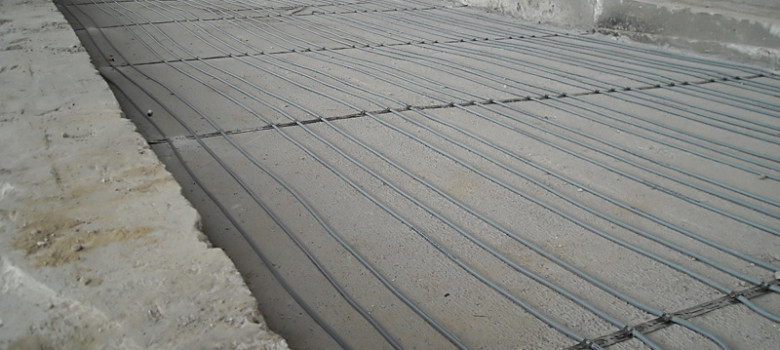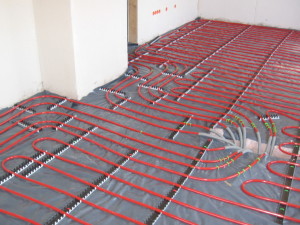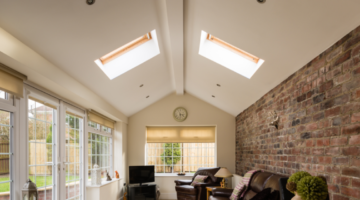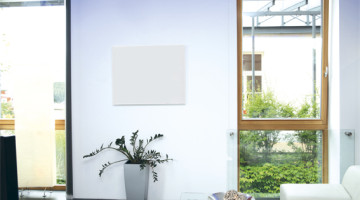
Underfloor heating – the answer for comfort and savings?
Underfloor heating can be a great way to heat your home – it looks good, it saves space, it is usually cheaper to run and it means no ugly radiators! One decision you need to make however is whether to go for a wet or dry system. In other words, do you want an electric underfloor heating system or one with plumbing and pipes?
There isn’t a one-size-fits-all answer. So lets take you through some of the pros and cons of each type of heating:
Wet systems – Pros
- Extremely efficient to run and works at low temperatures.
- Ideal for use alongside heat pumps to get amazing efficiency.
Wet systems – Cons
- Initial costs are very high
- The savings in comparison to radiators do not make it cost effective.
- Pipes are difficult to reach if there are any issues.
Electric systems – Pros
- Relatively inexpensive to install
- No pipework – easy installation.
- Easily installed on upper floors
Electric Systems – Cons
- Very expensive to run
- Placement of furniture and heavy items needs to be done carefully.
So as you can see there are pros and cons for each underfloor heating method and it is often not just a simple choice.
Cost of underfloor heating
This will depend a little on things like the type of floor you have – solid or suspended, but it is safe to say that a wet system is far more expensive. We generally see quotes at or about £100 per square metre to install a wet underfloor system. That can really add up over say a 50 square metre property!
Electric underfloor heating costs much less, with some systems as cheap as £20 per square metre. So for some it is a very attractive option. Running costs are likely to be much higher however, as the cost of electricity per unit is much higher than gas or a heat pump.
Should you get wet or dry underfloor heating?
This really does depend on your circumstances. If you have cheap electricity, with a solar or wind system, then electric underfloor heating may be competitive as an option. It certainly is cheap to install. If you are on the gas grid or able to go for a heat pump, then wet underfloor heating is a clear winner, especially for long term payback.
Electric heating can still be useful as an additional heating system to keep the bathroom floor warm for example, but it really shouldn’t be used as a main heating system unless you fall into a pretty specific category.














This is a really good article. Good work! We will share this via our social media channels.
Thanks guys! Hope it was useful.
thanks for info. Can anyone tell me, is there always the low background hum with a wet underfloor system. I live in a remote island situation partly because silence is important, and find the hum from systems I’ve experienced here very perceptible.
Hi Ros, I lived with a wet underfloor system for 10 years in a remote farm in the Pennines and I didn’t have a problem with the hum. However my boiler (wood pellet) was in an outhouse and so was the main heating pump. The heating pump of rate underfloor system was in a corridor within the house. Perhaps you might get hum if the pump is attached to wood rather than stone/brick as wood vibrates
It’s metre, not meter.
Wrong.
Hi
I am having an annex built for my son. Total floor area 50sq/m. It will have 4kw of solar panels installed during the build which will feed annex and house. I am advised that underfloor water heating is best, supplied off house LPG central heating. However, I feel that we should be able to run electric underfloor heating using solar elec. at a lower overall cost. Does anyone, unbiased, have advice on which to go for.
Hi Geoff,
the issue is that solar PV electricity production throughout the year is still massively skewed towards the summer months when the sun is shinning. Typically this isn’t when people want their heating. As a result I would install wet underfloor heating – run off your main heating system. This means if the solar system isn’t producing any electricity (during middle of winter) you don’t need to pull grid electricity to power it. Remember gas is approximately 3.5p/kWh while electricity is 10p/kWh. LPG is more expensive than grid gas (about 6.5p/kWh) but still this makes it the cheaper option. You could get a solar PV optimiser – this produces hot water (via the immersion heater) when your home is producing more electricity (from solar PV) than it is using from the grid. This would then work with the LPG central heating.
Hi thanks for the info I would love to have gas heating put into my bungalow but not shaw how to go about it,could someone give me some advise please,and let me know how much it would cost.I have solid fuel heating at the moment.
We are planning to refurbish our ground floor lounge which has a screed floor area of approx’ 21 sq m or 50 cubic m capacity. The floor covering would be 19 mm thick solid wood. The house was built in 1999 & the room has two (insulated) cavity walls including double glazed areas of approx’ 6 sq m. What would be the approximate cost to run an electric system? Presently the room is heated by one 90 cm x 60 cm double panel radiator, plus a gas fire for occasional back up.
Does the underfloor heating boiler,also be used for the hot water for a flat for the taps ??
HI wonder if you can advise me please, we are having an extension done with a concrete base and opening up the kitchen to this area which has floor boards as the base. The extension area is 25 sq m and the kitchen area is 16 sq m. Initially we were going to have electric underfloor heating in both areas, but i am really worried about the cost of running it as we are in a old house (Edwardian). The extension is going to have an all glass roof, bi-fold doors on one side but brick everywhere else. Unfortunately, we have had the floor already laid in the extension, but have now enquired about wet underfloor heating being laid on top. Can it be laid successfully & be effective on both types of floor? In the long run will this be the best way to heat the room as we are not planning on installing any radiators, but it’s quite a cold house. Would you advise we still have radiators? Thanks Charlotte